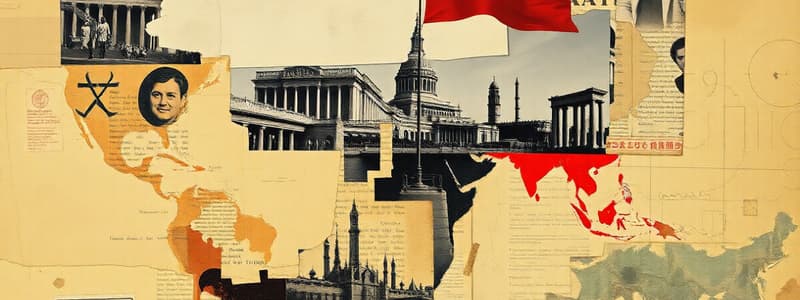Podcast
Questions and Answers
Which theory of International Relations emphasizes the importance of ideas and identities in shaping state behavior?
Which theory of International Relations emphasizes the importance of ideas and identities in shaping state behavior?
- Realism
- Liberalism
- Marxism
- Constructivism (correct)
What do international organizations primarily facilitate?
What do international organizations primarily facilitate?
- Promotion of unilateral actions by states
- Cooperation and coordination between states (correct)
- Isolationism between states
- Withdrawal of states from global affairs
Which of the following is NOT a recognized key factor contributing to conflict?
Which of the following is NOT a recognized key factor contributing to conflict?
- Social tensions
- Cultural celebrations (correct)
- Economic inequalities
- Political disputes
What is the focus of feminist International Relations?
What is the focus of feminist International Relations?
Which mechanism is NOT a part of global governance?
Which mechanism is NOT a part of global governance?
Realism in International Relations primarily views conflicts as:
Realism in International Relations primarily views conflicts as:
Which of the following strategies is NOT typically associated with conflict resolution?
Which of the following strategies is NOT typically associated with conflict resolution?
In the context of global governance, what challenge is primarily associated with differing national interests?
In the context of global governance, what challenge is primarily associated with differing national interests?
Flashcards
International Relations
International Relations
The study of interactions between countries, covering diplomacy, war, economics, and trade.
Realism (IR)
Realism (IR)
International relations theory focusing on power, national interests, and the anarchic nature of the global system; conflict is inherent.
Liberalism (IR)
Liberalism (IR)
International relations theory stressing cooperation, interdependence, and the role of institutions in promoting peace.
Constructivism (IR)
Constructivism (IR)
Signup and view all the flashcards
Global Governance
Global Governance
Signup and view all the flashcards
Conflict Resolution
Conflict Resolution
Signup and view all the flashcards
International Organizations
International Organizations
Signup and view all the flashcards
Key IR Actors
Key IR Actors
Signup and view all the flashcards
Study Notes
International Relations Sciences
- International Relations (IR) is the study of interactions between countries, including diplomacy, war, economics, and trade.
- Key actors include states, international organizations, non-governmental organizations (NGOs), and multinational corporations.
- IR examines the causes and consequences of international events, seeking to explain patterns and trends in global politics.
Theories of International Relations
- Realism: Focuses on power, national interests, and the anarchic nature of the international system. States are the primary actors, and conflict is inevitable.
- Liberalism: Emphasizes cooperation, interdependence, and the role of institutions. Argues that international institutions and norms can promote peace and cooperation.
- Constructivism: Highlights the role of ideas, norms, and identities in shaping international relations. States' interests and identities are not fixed but can be constructed and changed.
- Marxism: Emphasizes class struggle and economic inequalities in international relations. Views the international system as a reflection of capitalist structures.
- Feminist IR: Examines how gender shapes international relations, focusing on issues such as war, peace, and security. Challenges traditional approaches that overlook women's experiences and perspectives.
Global Governance
- Refers to the complex network of international agreements, norms, and institutions that regulate and coordinate relations between states and other actors.
- Key areas of global governance include trade, environmental protection, human rights, and security.
- Challenges to global governance include state sovereignty, differing interests, and the lack of a global government.
- Mechanisms include international treaties, international organizations (IOs), and norms of behavior.
Conflict Resolution
- Addresses various aspects of conflict, employing diverse strategies to prevent, manage, and resolve conflicts.
- Strategies include diplomacy, negotiation, mediation, arbitration, and peacekeeping operations.
- Key factors contributing to conflict include political disputes, economic inequalities, and social tensions.
- Understanding root causes is crucial for effectively resolving conflicts.
International Organizations
- Organizations like the UN, WTO, and IMF facilitate cooperation and coordination between states.
- They perform various functions including setting norms, providing platforms for dialogue, and mediating disputes.
- IOs vary in structure & membership, reflecting differing levels of cooperation.
- IOs face limitations, such as their dependence on member states and potential for bias.
Diplomacy and Negotiation
- Diplomacy involves the use of communication, negotiation, and discussion to resolve international disputes.
- It involves both formal and informal interactions between states.
- Negotiation is a critical part of diplomacy, requiring skillful communication, compromise, and understanding of the other party's interests.
- Successful diplomacy often requires understanding cultural differences and diverse perspectives.
Studying That Suits You
Use AI to generate personalized quizzes and flashcards to suit your learning preferences.




